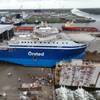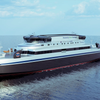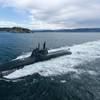The EU is limbering up to set new restrictions on sulfur in marine fuels, if MARPOL Annex VI is not implemented quickly, explains Ian Adams, secretary general of the International Bunker Industry Association (IBIA). At the same time, the European Commission aims to clarify its own directive on sulfur limits for marine diesel oil, which have been subject to different interpretations in different countries.
The EC believes that for sulfur oxide, the cost of reducing emissions from ships is now considerably lower than further abatement measures in other sectors. So shipping is in the frame, says Adams.
An EU study now underway will quantify ship emissions of SO2, NOx, CO2 and hydrocarbons in the North Sea, Irish Sea, English Channel, Baltic Sea, Black Sea and Mediterranean, on the basis of year 2000 ship movements. The commission is also taking advice on the costs to the oil industry of providing more low-sulfur marine fuels in the future, and likely price premia for these fuels.
As far as sulfur is concerned, the main document at present is Directive 1999/32 on the Sulfur Content of Liquid Fuels, which already sets sulfur limits for marine distillate oil used in Community territorial waters, and also commits the Commission to "consider which measures could be taken to reduce the contribution to acidification of the combustion of marine fuels other than distillates, and, if appropriate, make a proposal."
MARPOL Annex VI designates two Sulfur Emission Control Areas — the North Sea & English Channel, and the Baltic Sea — where fuel burned by ships must be below 1.5 percent sulfur. These requirements will be monitored using bunker delivery notes and ship log books. Alternative methods such as exhaust scrubbing, which limit emissions to the equivalent level are also permitted, provided these are verifiable and enforceable. The EC hopes to publish a proposal to modify directive 1999/32 on the sulfur content of liquid fuels. The proposal will aim to clarify the existing requirements on marine gas oil. Depending on progress with ratification of Annex VI, the proposal may also extend the scope of the directive to include marine heavy fuel oils.
Directive 1999/32 currently prohibits the use of marine gas oils having over 0.2 percent sulfur in community territorial waters. The directive's definition of marine gas oil includes DMA, DMB, DMC and DMX grades — thereby including marine diesel oils.
There is an exemption for fuel used by ships coming from third countries. DG Environment has recently stated that its interpretation of this exemption is that these ships may burn whatever marine gas oil they have in their tanks until they make their first stop at a community port. Thereafter, like all intra-EU shipping traffic, if they are burning gas oil, these ships must use only gas oil which has a sulfur content below 0.2 percent while in community ports and until they leave Community territory.
In transposing the directive, some Member States (Sweden, Belgium and France) have also prohibited the sale of the higher-sulfur marine gas and diesel oils in their territory.
The community might authorize or require the use of flue gas desulphurization (scrubbing equipment) as an alternative to the use of low sulfur fuels. Various scrubbing systems are being developed, particularly in North America, and the technology offers considerable potential. However, nothing has been decided, and market-based measures are also under consideration.
Several ports in the EU already differentiate their dues to favor ships using low-sulfur fuel and/or NOx reduction technology. Sweden has introduced environmental differentiation to its national fairway dues.
The EU is considering a port-administered system of levies and rebates. The levies and rebates would be based on NOX and SO2 emissions and distance traveled, and not on ship tonnage. The principle would be for a "standard" charge, for emissions in a designated sea area, which is paid unless the ship provides evidence of lower emissions.
The idea of emissions trading for NOX and/or SO2 emissions from ships in certain sea areas is being explored by the Commission and others, and IBIA endorses this approach.
DG Environment proposes to let a study contract during 2002 to consider in more detail the possible EU-wide application of various market-based mechanisms. Separately, the Swedish Maritime Administration and BP Marine are both taking forward work on emissions trading on SO2 and NOX for ships. The EU still hopes IMO and MARPOL will do the job, but it looks much more likely that during 2003 we shall see proposals for new regional rules in Europe.
EMMF Scheme Is Quality
ExxonMobil Marine Fuels has introduced a quality guarantee scheme. The scheme will apply to fuel contracted directly from EMMF and supplied through EMMF's contracted barge fleet. "We observe the most rigorous product quality standards in all our refineries and terminals throughout the world. We also have the highest standards in the industry for all our own and contracted barge operations. This combination ensures that those customers who receive deliveries direct from EMMF can be confident that the operation will be conducted properly, safely and efficiently," says Peter Healey, head of EMMF. "But in cases where our product is on-sold through an intermediary, this may not be enough. We cannot, for example, guarantee the quality of fuel originally sold by ExxonMobil in good faith to an intermediary and then delivered on board a vessel by that intermediary as bunker fuel."
Sponsored Content
Chris-Marine’s solutions help to prolong engine lifetime

March 2024
 Read the Magazine
Read the Magazine

 Read the Magazine
Read the Magazine
This issue sponsored by:

Inland Waterways: Measuring Impact State by State
Subscribe for
Maritime Reporter E-News
Maritime Reporter E-News is the maritime industry's largest circulation and most authoritative ENews Service, delivered to your Email five times per week










